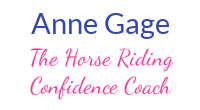You’ve had a tumble from your horse and you’ve dusted yourself off, got back in the saddle and tried again. You can feel the adrenaline in your body, but you push down the fear and carry on.
And the next time you go to ride, you feel that uncomfortable feeling of fear again. Only this time, you can’t push it away or ignore it.
You feel frustrated and annoyed with yourself. Why can't you just get over it? You wonder what’s going on.
Fear After A Horse Riding Fall
You’ve suffered a trauma. A fall from a horse (even without an injury), or a frightening experience while riding can be traumatic.
A trauma reaction is the overwhelming emotional, behavioral, and physical state following a traumatic event.
And it can happen to anyone - even very experienced riders! It happened to me even though I was a professional horse riding coach and horse trainer.
Signs Of Trauma After A Fall
Pay attention to your emotions, thoughts and physical sensations after a fall from your horse or riding scare.
You might feel:
- sad,
- frustrated,
- angry,
- not good enough,
- irritable, or
- anxious.
You might withdraw from your horse, barn friends, or people in general.
You might even lose interest in riding all together.
You might feel jumpy or nervous when you’re grooming your horse.
You might feel tense as you ride near the area where that unpleasant experience happened.
Notice if you are fully present in the moment with your horse. Are you worrying about might happen? Or are you reliving the memory of what happened in the past?
Fearful thoughts are generally based in the past (i.e. an unpleasant memory) or in the future (i.e. imagining something bad happening) and is inappropriate, unhelpful fear.
And it's being created in your mind.
Fear is only helpful and appropriate if you are actually in immediate physical danger.
Why Logic Doesn't Work
Whether or not you kept riding after that traumatic event, the fear can stick with you because your brain has been rewired.
And because your brain wants to keep you safe, the fear part of your brain (the amygdala) gets triggered when it "thinks" you're going to repeat the activity that caused the trauma.
Once triggered, the amygdala takes over while the logical part (the frontal lobe) goes offline. Rational thinking no longer works and it feels like you are out of control.
3 Steps To Reset Your Mindset
Here are 3 steps you can take to get your mind back under control.
1. Focus On Your Breath - Rein in the fear response by inhaling through your nose for 4 seconds, holding for 4 seconds, and exhaling through your nose for 6 seconds.
This breathing technique turns off the sympathetic nervous system (fight or flight), turns on the parasympathetic nervous system (calming), and gives you time to ground yourself and focus on the present moment.
2. Be Self-Aware - Notice the thoughts, emotions, and physical feelings you have when you feel anxious.
What is your posture like? Take an open posture - eyes looking at the horizon, chin parallel to the floor, chest lifted, shoulders open.
Where are you holding tension in your body? Use a body scan to release tension from your head (including your face, jaw, and neck) to your toes. Focus on each part and release the tension as you exhale.
What thoughts, beliefs, and emotion is connected with that physical feeling?
3. Question Negative Thoughts and Beliefs - As you become aware of the thoughts and beliefs you’ve identified in step 2, ask “is it true?”
For example, if the thought is “I’m not a good rider", look for evidence that proves that to be false.
If you honestly believe it to be true, then ask yourself what you need to do to change it.
This gives your brain a problem to solve and stops the unhelpful cycle of ruminating.
If you find it too difficult to work out the trauma on your own, reach out for help.
Talking with someone who understands what you’re going through might be all you need.
Or you can work with someone who is an expert in helping anxious riders and who can help you process the traumatic memories so you can feel safe and enjoy every ride again.
If you want expert help regaining your horse riding confidence (from a coach who truly understands what you're going through), click here to schedule your FREE Horse Riding Confidence Strategy session by Zoom to discuss your situation and set a plan of action for your success.

